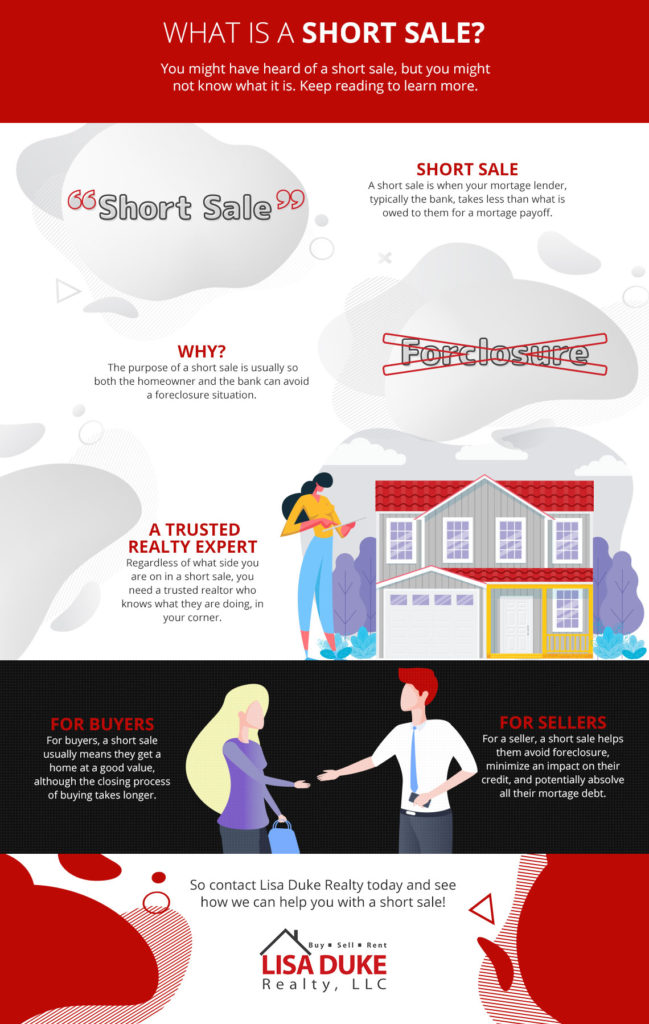Short Sale
Short Sales Looking for information about short sales? Read thru the list of Questions and Answers below for common questions and misconceptions about short sales. If you need more information email Lisa Duke your short sale question.

Q: What is a short sale?
A: A short sale, in regards to real estate, is a sale where the seller’s mortgage lender agrees to accept a mortgage payoff of less than the face value of the loan. Simply put, it’s a sale where the bank is taking less than what is owed to them.
Q: Are all short sale homes going through foreclosure?
A: No. While some short sale homes are in the foreclosure process, many have not yet entered the foreclosure process and are short selling so both bank and homeowner can avoid foreclosure altogether.
Q: Can all real estate agents work with short sale homes?
A: Yes, any agent can assist you with a short sale. However, not all agents have the experience to avoid the pitfalls or know how to help you expedite the short sale process. You should consider using experienced and certified short sale professionals.
Q: How common are short sales?
A: According to a Feb 2009 article on cnn.com, about 11% of home sales in 2008 involved short sales. That number is expected to climb this year. The North East Florida database indicates about 8.5% of home sales in 2008 involved short sales in North East Jacksonville.
Q: Are short sale homes listed differently than normal sale homes?
A: A good real estate agent makes it clear to buyers that a home is a short sale. It is important to disclose this for both buyer and seller because the closing process is usually longer and it is important to work with an agent familiar with the process.
Buyers
Q: As a buyer, what are the benefits to buying a short sale home?
A: The main benefit of a short sale home for buyers is the opportunity to get a home at a good value. With the majority of short sale homes, a buyer is usually paying LESS than the appraised value of the home, so buyers are getting an immediate return on their investment.
Q: What are some drawbacks to buying a short sale home?
A: The biggest drawback to purchasing a short sale home is length of time it takes for the sale to close. Typically, for a non short sale home, the ownership process takes about 30 days. Short sale closures range from 45 days to 6 months. There may also be some tax ramifications when buying a short sale home, so it is important to use an experienced real estate agent who can address all issues and concerns pertaining to the purchase. If you are interested in buying a short sale home, it is important that you contact both a CPA and a Tax Attorney for legal advice.
Sellers
Q: What is the advantage to short selling for the seller?
A: Typically, if a short sale is sought, it is because the homeowner needs to sell and cannot pay off their mortgage in full. A short sale lets the owner negotiate with the bank an acceptable sale amount, and the seller does not take as significant a hit on their credit as if they were getting foreclosed on. There is less of an impact on the sellers credit score, and often times all mortgage debt is absolved.
Q: For sellers, what is the first step to short selling a home?
A: Ideally, a seller attempts a short sale before they default (miss a payment) on their loan. The first step is to contact the lender (mortgage company) and let them know your situation. In this troubled economy, many lenders are willing to work with homeowners, and provide options so that foreclosure is not the outcome. If the homeowner and lender agree to a short sale, the next step is selecting a qualified and experienced short sale real estate agent.
For more information about short sales CLICK HERE
